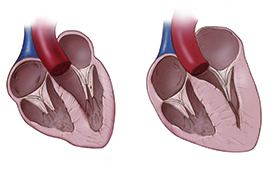Cats are the perfect pets: affectionate, playful, and fun. They illuminate the daily life of the house and the guardians tend to take care of the cats with great affection. But do you know all the diseases that your cat can have? In this Animal Expert article we will talk about feline hypertrophic cardiomyopathy, a disease of the circulatory system that seriously affects.
Here’s what the symptoms and treatment of this disease are explained, so you know what to expect during your visit to the vet or what the next step of treatment will be.Read!
- Feline hypertrophic cardiomyopathy is the most common heart disease in cats and is believed to have an inherited profile.
- This disease causes a thickening of the myocardial mass in the left ventricle.
- As a result.
- The volume of the heart chamber and the volume of blood that the heart pumps are reduced.
It causes deficiencies in the circulatory system, preventing the heart from pumping properly. It can affect cats of any age, although it is more common in older cats. Persians are more prone to this disease. And according to statistics, men suffer more than women.
Thromboembolism is a common complication in cats with myocardial problems.It is produced by the formation of a clot that can have different effects, depending on where it is located.This is a consequence of poor circulation, which causes blood to stagnate and clots to form.
It is an important complication that can cause paralysis or sagging limbs, and is very painful for the patient, a cat with hypertrophic cardiomyopathy may have one or more episodes of thromboembolism during his life, these episodes can lead to the death of the cat.your cardiovascular system is under a lot of stress.
Feline hypertrophic cardiomyopathy may have different symptoms depending on disease progression and health status, symptoms that may occur include:
When the condition becomes complicated and thromboembolism occurs, symptoms are:
The most common disease in cats with this disease is respiratory dyspnoea accompanied by vomiting, in the early stages of the disease you will only notice the cat more apathetic than normal, avoiding playing or moving and having difficulty breathing normally.
As we have seen, the cat may have different symptoms, depending on the different stages of the disease, if the disease is detected before thromboembolism complications develop, the prognosis is favorable.
It is very important that the disease is diagnosed before the cat is subjected to other minor surgeries, such as sterilization, as ignorance of this disease can cause major problems.
A routine test on an asymptomatic cat may not detect the disease, so it’s important to do more thorough tests from time to time.Echocardiography is the only diagnostic test of this disease.The electrocardiogram does not detect this heart problem, although it can sometimes detect disease-related arrhythmias.Chest x-rays only detect the most advanced cases.
In any case, this is the most common heart condition in cats, and at any time, your veterinarian will perform the necessary diagnostic tests.
Treatment of feline hypertrophic cardiomyopathy varies depending on the clinical condition of the animal, age and other factors, cardiomyopathies have no cure, all we can do is help your cat live with the disease, the veterinarian will inform you of the appropriate drug combinations for your cat The drugs most commonly used in cardiomyopathy are :
As for the diet, do not change it too much, it should be low in salt to avoid sodium retention, which in turn can cause water retention.
It is the second most common cardiomyopathy in cats.It is caused by dilation of the left ventricle or both ventricles and lack of force in contraction.In other words, the heart cannot dilate normally.Dilated cardiomyopathy can be caused by a taurine deficiency in the diet or by other unspecified causes.
Symptoms are similar to those described above, such as
The prognosis of the disease is severe. If it is caused by an insufficient amount of taurine, the cat can recover after proper treatment, but if the disease is caused by other factors, your cat’s life expectancy will be about 15 days.
Therefore, it is very important that you take care of feeding your cat.Commercial foods often contain the amount of taurine needed for your cat.You should never give him dog food as it does not contain taurine and can cause this disease.
If your cat has been diagnosed with feline hypertrophic cardiomyopathy or dilated cardiomyopathy, it is very important that you work as hard as possible with the veterinarian, he will advise you on the most appropriate treatment for each case and the care to seek.a stress-free and fear-free environment, take care of the cat’s diet and keep an eye out for any episodes of thromboembolism.Even if the prevention of these episodes continues, there is always a risk of them occurring.
This article is merely informative, at Animal Expert.com.br we cannot prescribe veterinary treatments or carry out any type of diagnosis, we suggest that you take your pet to the veterinarian in case of any type of condition or discomfort.
If you would like to read more articles similar to, we recommend that you go to our Hereditary Diseases section.

